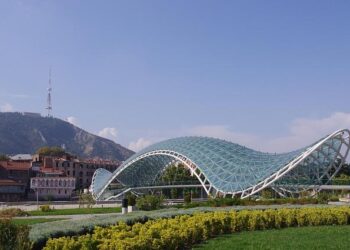Bridging continents and cultures, Georgia occupies a unique position at the crossroads of Europe and Asia. While often associated with the South Caucasus region, debates over Georgia’s continental identity continue to gain momentum within political and cultural spheres, especially in the context of its aspirations towards European integration. This article explores why Georgia is considered part of Europe from geographical, historical, and cultural perspectives, shedding light on its longstanding ties with the continent and its growing significance within the EU NEIGHBOURS east framework.
Georgia’s Geographic Position at the Crossroads of Europe and Asia Explored
Positioned at the strategic nexus between the Black Sea and the Caucasus Mountains, Georgia’s location is a natural bridge between two vast continents: Europe and Asia. This geographical setting has not only shaped its climate and biodiversity but has historically made it a pivotal crossroads for trade, culture, and political influence. Nestled along the ancient Silk Road, Georgia served as a gateway for merchants and travelers, facilitating an exchange of goods, ideas, and traditions that enriched its diverse cultural tapestry.
The significance of Georgia’s geographic position can be further understood through its proximity to key neighboring regions, acting as a corridor connecting major urban and economic centers. Below is a snapshot of Georgia’s location relative to prominent cities in Europe and Asia:
| City | Continent | Distance from Tbilisi (km) |
|---|---|---|
| Istanbul | Europe | 1,055 |
| Moscow | Europe | 1,740 |
| Yerevan | Asia | 280 |
| Baku | Asia | 450 |
Key geographical factors contributing to Georgia’s role as a Eurasian crossroads include:
- Mountain passes of the Greater Caucasus range facilitating north-south routes
- Access to the Black Sea, providing maritime links to Europe
- Major highways and rail lines connecting East and West
Tracing Georgia’s Historical Ties with European Civilizations and Empires
Georgia’s history is deeply intertwined with the major European civilizations and empires that shaped the continent over centuries. From the Hellenistic era when Greek colonies flourished along the Black Sea coast, to integration within the Roman and Byzantine Empires, Georgia served as a vital bridge between East and West. The ancient kingdom of Colchis, famous for the myth of the Golden Fleece, attracted traders and emissaries from far-flung European powers, underscoring its importance in early European trade networks. Georgia’s Christianization in the 4th century further solidified its cultural and religious connections with Europe, influencing medieval architecture, literacy, and art that resonate with European orthodox traditions to this day.
Medieval Georgia also played a pivotal role as a crossroads for empires such as the Ottoman and Persian, while maintaining diplomatic and military alliances with European monarchies, including the Kingdom of France and the Holy Roman Empire. The subsequent centuries witnessed cultural exchanges highlighted by Georgian scholars and artists traveling across Europe. Key periods of interaction include:
- 4th-6th centuries: Byzantine political and religious influence
- 12th-13th centuries: Golden Age under Queen Tamar with European crusader contact
- 18th century: Diplomatic ties with Russian and Eastern European courts
| Era | European Influence | Impact on Georgia |
|---|---|---|
| Hellenistic Period | Greek Colonization | Trade expansion & cultural diffusion |
| Byzantine Empire | Religious & political alignment | Christianization & architectural styles |
| Medieval Era | European Crusades | Military alliances & cultural exchange |
Cultural Bridges and Modern Integration Opportunities for Georgia within Europe
Nestled at the crossroads of Europe and Asia, Georgia has long served as a vibrant conduit for cultural exchange, fostering a unique blend of traditions that resonate both east and west. This intricate tapestry is evident in its language, architecture, and gastronomy, which weave together influences from ancient Greek colonies, Persian empires, and the Silk Road’s thriving commerce. Georgian polyphonic singing, recognized by UNESCO, stands as a testament to the nation’s profound artistic heritage that continues to captivate European audiences. Moreover, the resilience demonstrated throughout centuries of political upheaval has solidified a spirit of cooperation, making Georgia a natural partner for contemporary European integration efforts.
Modern opportunities for integration are anchored in both shared values and evolving strategic interests. The country’s commitment to democratic reforms, renewable energy projects, and digital innovation aligns closely with the EU’s ambitions, paving new pathways for collaboration. Below is a snapshot of key sectors where Georgia and Europe are deepening ties:
- Renewable Energy: Expansion of hydro and solar power projects benefiting from EU funding.
- Transport Corridors: Development of transcontinental routes improving connectivity and trade.
- Education and Research: Participation in Erasmus+ and Horizon Europe programs encouraging knowledge exchange.
| Integration Area | Current Status | Future Potential |
|---|---|---|
| Digital Economy | Growing IT sector, startup hubs in Tbilisi | EU market access, cyber security partnerships |
| Trade Relations | DCFTA agreement in effect | Expansion into new European markets |
| Environmental Policies | National strategy aligned with EU Green Deal | Joint climate resilience initiatives |
Final Thoughts
In conclusion, the question of whether Georgia belongs to Europe is more than a matter of geography-it is deeply embedded in the country’s rich historical narrative and vibrant cultural identity. Straddling the crossroads of East and West, Georgia embodies a unique blend of European heritage and traditions, underscoring its long-standing ties to the continent. As the country continues its path towards closer integration with the European Union, acknowledging Georgia’s European character is essential for fostering mutual understanding and cooperation. Ultimately, Georgia’s place in Europe is not just a geopolitical aspiration but a reflection of its enduring legacy and its future as an integral part of the European family.
















